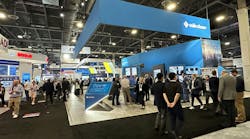Committee Opens Lines of Communication
Q: What is AICC and what kind of work do they do?
A: The Alarm Industry Communications Committee (AICC) is a "pan-association" committee composed of CSAA, NBFAA, SIA, and the larger alarm companies and manufacturers such as Honeywell Ademco, Vector Security and the Security Network of America (SNA).
AICC is a closed group in so far as its members remit dues over and above dues paid to the associations directly. These companies believe firmly that certain issues need to be handled swiftly and in a cooperative atmosphere. Having served as AICC's chairman for the last 12 years, I can attest to how hard committee members work. AICC operates "break even" and uses the dues revenue to retain a law firm, a lobbyist and pay its operating expenses. It will have special fund-raising programs, when warranted, to accomplish special programs.
First of all, any telecommunications issues, both wireless and wireline, fall under AICC. Issues pertaining to short range radio also go on AICC's plate. They comment on FCC issues and attempt legislation favorable to the security industry. But its greatest role is educating the industry on what's happening in D.C. on alarm industry related matters.
AICC recently commented, through its attorneys, to the FCC on Broadband over Power Line (BPL) and Voice of Internet Protocol (VoIP) matters. Both are critical to the alarm industry, law enforcement and other public service entities.
FCC has granted AICC the right to perform Frequency Coordination on the entire Part 90 allocation. Robert Bitton of Supreme Security, Inc. has performed this volunteer service for the last 15 years. He limits his service to the exclusive alarm frequencies but is able to coordinate frequencies in the entire band.
AICC is now trying to pass legislation allowing monitoring companies to have Reciprocal licensing in all states for monitoring; it has taken the lead in educating and working with others to solve the VoIP issues; and, it's working with the FCC and others to at least try to delay the "sunseting" of AMPS cellular.
AICC is exploring possible remedies available to alarm companies in dealing with the "sunseting" of AMPS cellular service. These involve either convincing the FCC to delay their order or convincing the cellular carriers to either continue service or leave the control channels on line for a while. What remains uncertain is the economic or technological viability of continuing the control channels. Can they be left on line? If the cellular carriers can effectively leave the control channels "up," there may be a viable solution.
On the VoIP front, AICC has opened a dialogue with the National Cable & Telecommunications Association (NCTA) in Washington, DC. Hopefully, in a cooperative atmosphere, the cable companies and their manufacturers will work with AICC to find an early solution to the VoIP issue.
At a recent meeting with NCTA, AICC asked for four items from the cable companies: the ability to pass digital alarm communicator signals undistorted, ensure Line Seizure is not compromised, the ability to provide for alarm control panels to "see" a telephone line equivalent; and, finally for the premises cable and VoIP hardware to have sufficient battery backup.
Louis T. Fiore is a consultant from Sparta, NJ. He is Past President of CSAA (1997-1999) and President of L.T. Fiore, Inc. His practice includes the use of wireless and the Internet for alarm monitoring as well as regulatory issues for security systems in general. He also serves as Chairman of Central Station Alarm Association's (CSAA) Alarm Industry Communications Committee (AICC) and Standards Committee. He is the current chairman of the SIA's Security Industry Standards Council (SISC) and a long-time member of the Supervising Station Committee of NFPA 72. Send your questions to [email protected].

